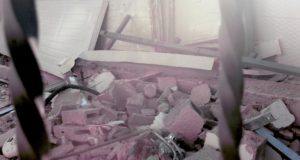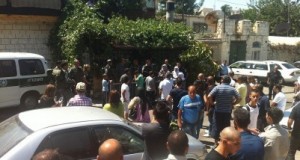8 November 2010 | International Solidarity Movement & Wadi Hilweh Information Center
Today, workers from the Jerusalem municipality and Israeli forces removed the Memorial of Samer Sarhan, this morning. They also removed the water supply donated on the soul of Samer Sarhan and the olive tree planted in the place, although the tree was present prior to the monument. The operation took place under the monitoring of an Israeli helicopter in the area. Vehicles of municipal workers and Israeli forces emerged after the enforcement of the task in less than ten minutes. One eyewitness and a resident of the region said, “members of the Israeli police came earlier to take pictures of the site of the memorial. They must have have studied how to implement the process in a very short time and leave before a large number of residents noticed them.” He adds, “police were not alone for the removal of a martyr’s memorial, but were accompanied by the head of settlers’ guards in Silwan.”
Miri Regev, a member of the Israeli Knesset for the Likud party, and former spokesperson for the Israeli Army, was sent to the mayor of Jerusalem, Nir Barkat, yesterday, demanding that he remove the memorial of Silwan resident Samer Sarhan, 32, who died on the twenty-second of September after being shot by a settler guard.
In recent weeks, the East Jerusalem neighborhood of Silwan has become a flashpoint of settler and Palestinian confrontation. Over 33 young Palestinian men between the ages of 8 and 16 were arrested in October alone, mostly for being accused of throwing stones.
Violent clashes between armed Israeli forces, settlers, and Palestinian youth are now an almost daily occurrence in the area. This recent pattern of unrest comes directly in response to the shooting death of Samer Sarhan, killed by one of the many private settler guards who act with impunity in East Jerusalem.
As news of Samer’s martyrdom reached the Palestinian population, spontaneous protests broke out throughout the city, peaking during Samer’s funeral when over one thousand mourners confronted the armed Israeli occupation forces present at the cemetery.
According to testimonies from the ground, Sarhan was walking towards his home at 4.00 a.m. in his neighborhood of al-Bustan, when he was shot by an armed Israeli security guard patrolling the area.
The Israeli security guard who shot Sarhan was called by Israeli police for interrogation on the same day, but was immediately released under the pretext that the murder of Sarhan was in self-defense. According to him, Sarhan intended to ambush the settlers and security guards in order to kidnap them. These accusations are soundly denied by Sarhan’s family and al-Bustan’s Popular Committee.
During the protests, the Israeli occupation forces employed tear-gas bombs and rubber-coated steel bullets, which led to many physical injuries, as well as suffocation inside peoples’ homes.
On September 24th, a 14-month old toddler-martyr in Issawiya named Muhammed abu-Sneneh was murdered in his house after having suffocated gas that was fired at residents and their houses. The Israeli occupation forces attacked a peaceful demonstration of residents who held a symbolic funeral for the baby. A total number of 16 Palestinians are reported to have been arrested on the 25th by the occupation forces and large amount of armed policemen and Special Forces were present in all major Arab neighborhoods of the city.
On October 8th, a settler named David Be’eri ran over two boys as they threw rocks at his car, and was caught on video with his license plate in the act. The boys were rushed to the hospital with some broken bones. The settler was questioned about the incident but suffered no consequences. These Palestinian boys were later arrested, and on October 17th, a Jerusalem court accused them of throwing stones and ordered to be placed on two weeks of house arrest. All three were questioned by police and found to be “involved in disturbances and riots” in the neighborhood of Silwan, said Mickey Rosenfeld, spokesman for the Israeli national police.
 International Solidarity Movement Nonviolence. Justice. Freedom.
International Solidarity Movement Nonviolence. Justice. Freedom.


